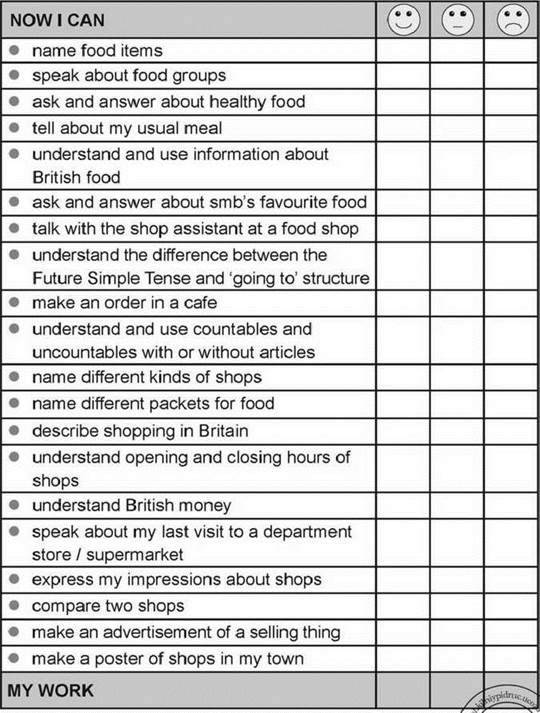GOING SHOPPING
Unit 3 CAFES AND SHOPS
Lesson 2 GOING SHOPPING
VOCABULARY
1 Look, listen and repeat.
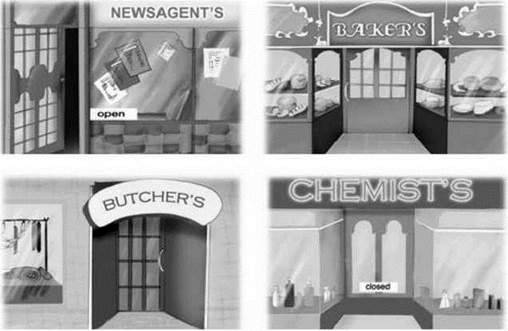
At the newsagent’s they sell newspapers, magazines, copybooks, pens.
At the baker’s you can buy bread, buns, rolls, cakes and pies.
At the butcher’s they sell meat, chicken and sausages.
At the chemist’s you can buy medicines, toothpaste, shampoo and bars of soap.
2 Ask and answer in pairs using the words.
Sweets; a toothpaste; buns; a parrot; a hat; a mug; a pair of shoes; a table; a pair of skis; oranges; books; a frog; medicines
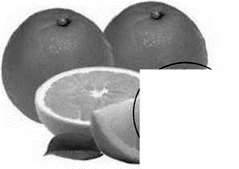
A: Where can I buy… ?
B: You can buy it at…
A: Where do they sell…?
B: They sell… at…
3 Read and fill in the words from the box.
Yesterday Mrs Stone went shopping. At the supermarket she bought many things:
…
… of chocolate
… of bread
… of flour
… of tea
… of coffee
… of tomato ketchup
… of meat
… of cheese
… of fish
… of cola
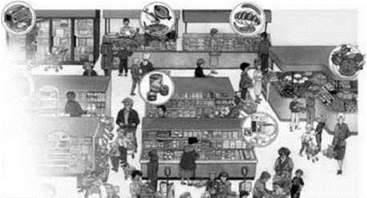
A bar, a bottle, a carton, a packet, a kilo, a loaf (loaves), a pound, a jar, a tin, a bag
4 Guess what they sell and say what you can buy at these
Shops.
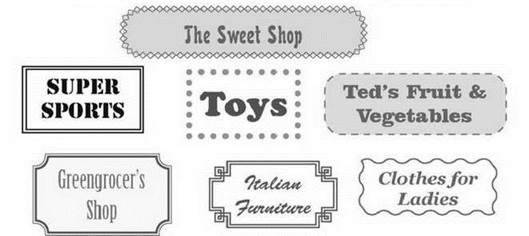
DO YOU KNOW?
BAKER’S, GREENGROCER’S, BUTCHER’S is short for baker’s shop, greengrocer’s shop, butcher’s shop. Everybody knows it is a shop, so we can leave the word out.
For example: I’m going to the greengrocer’s to get some oranges and some tomatoes.
READING
1 Read and name some popular British shops.
Shopping in Britain
When you want to buy something you go to a shop or market. To buy food in Britain people usually go to the baker’s, to the butcher’s, to the sweet
But nowadays supermarkets become more and more popular. They use the self-service system. It means you walk round the shop and choose what you want. You can use trolleys. At the exit you pay for all your goods at the cashier.
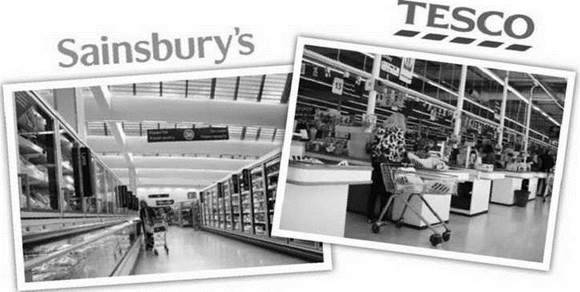
If you are a traveller in Britain, you should know some popular shops and supermarkets. Sainsbury’s are very big supermarkets. They are for richer people who want to do shopping once a week or even once a month. Tesco supermarkets are leaders, too. But they sell goods at cheaper prices. British Home Stores (BHS) is a group of large shops selling mainly clothes and other products for the houses. Buying clothes in Britain can be a problem for Europeans, because they have different size system. Ready-made clothes departments in London usually use both British and European sizes on the tags1.
There are some traditions about shopping in Britain. Mothers usually buy clothes for their small children, but British teenagers usually buy clothes by themselves. The British usually buy food in supermarkets once a week.
Don’t forget that the British use ‘please’ and ‘thank you’ a lot.
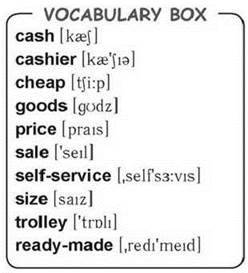
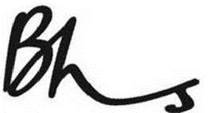
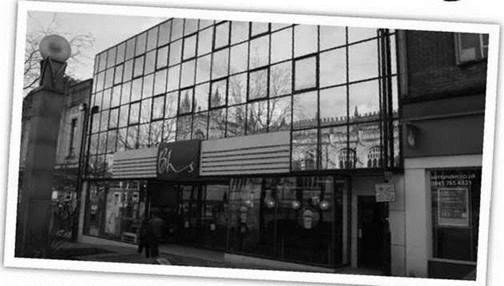
1a tag – ярлик
2 Complete the sentences.
A
1 They usually buy food at the………
2 Supermarkets………
3 In the supermarket you…………..
4 If you are a traveller in Britain…………
5 Sales are……………..
6 Sainsbury’s supermarkets are…. ……
В
1 Tesco supermarkets sell……
2 British Home Stores is a group of………….
3 Buying clothes can be a problem because………….
4 Ready-made clothes in London…………….
5 Teenagers in Britain………….
6 Mothers in Britain……………..
7 You can hear………………….
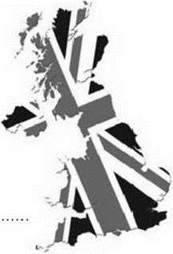
3 Ask and answer in pairs.
1 What can you buy at the baker’s?
2 What can you buy at the butcher’s?
3 You buy sweets at the greengrocer’s, don’t you?
4 Where can you buy sour cream?
5 Where can you buy fish?
4 Speak about shopping. Work in groups.
1 Do you like shopping? Why / Why not?
2 What kinds of shops do you like? Why?
3 What kinds of shops don’t you like? Why?
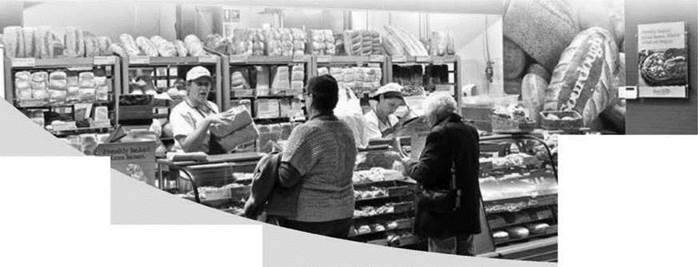
– 5 Listen to the song and name the shops that are in the street where John lives.
IN MY STREET
I am John.
Let me tell you about my street.
It is not very long.
There are some shops in the street and a lot of trees.
There is a baker’s shop with fresh bread and a greengrocer’s with fresh fruit and vegetables.
I go to the supermarket every day.
It is next to my house.
It is not a busy street so we ride our bikes there.
Some boys play ball in the street, but it is dangerous1.
There are no tall buildings there, just family houses and small blocks of flats.
There are a lot of cats in my street.
I have some nice neighbours.
I love my street very much.
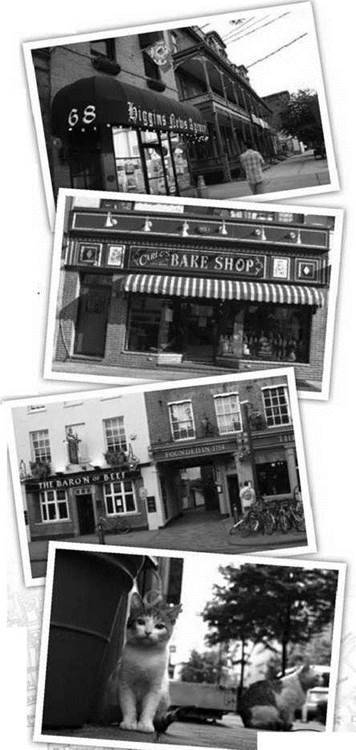
LISTENING
1 a) Before listening look through the photos and say what you see in them.
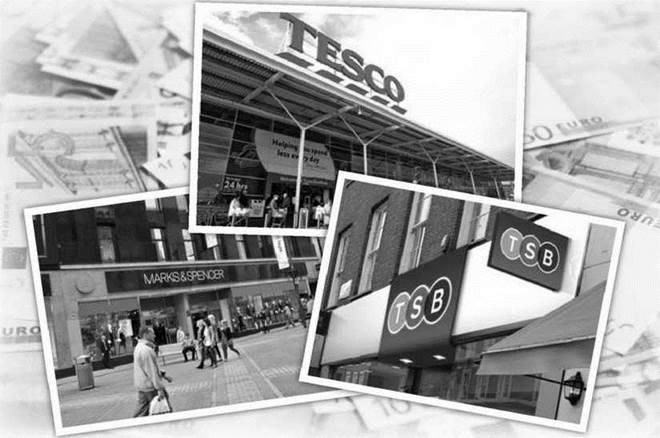
B) Listen and name the best-known shops in Britain.
If you go shopping in Britain it’s important to know that most shops open at 9.00 am and stay open all day till 5.30 or 6.00 pm. Some are open 24 hours a day. The best-known shops you can find in any British town are Tesco, Marks &p; Spencer, a large clothes shop with a food section, and Boots, which sells mainly toiletries and medicines.
If you need to change money you can do it at Barclays, Lloyds TSB or some other British banks. Pounds and hence are the British money.
C) Answer the questions.
A) When are the most shops open in Britain?
B) What time do British shops stay open?
C) Where do they sell clothes?
D) Where do they sell toiletries?
E) Where can you go when you need to change money?
F) What is British money called?
2 a) Listen and read.
British Money
1 penny, 2 pence [pens], 5 pence,
10 pence, 20 pence, 50 pence.
1 pound (£ 1) = 100 pence
5 pounds (£5), 10 pounds (£10),
20 pounds (£20), 50 pounds (£50),
100 pounds(£100)
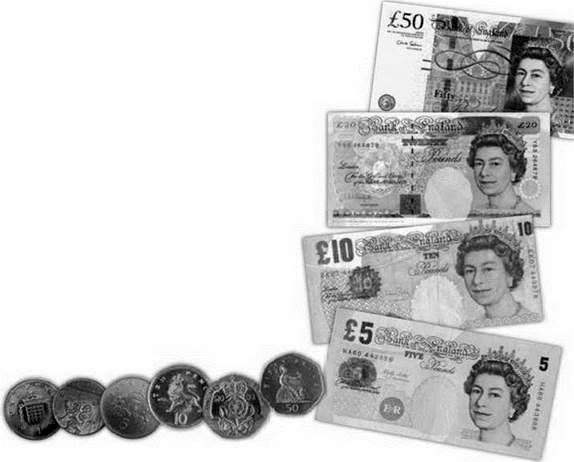
B) Read and compare the sentences.
How much is it?
How much is this newspaper?
How much is the dress?
How much is that book?
How much are they?
How much are these shoes?
How much are the jeans?
How much are those two books?
C) Read and pronounce.
It is £15 (fifteen pounds).
The dress is £50.25 pence (fifty pounds twenty-five pence). They are £24 and 10 pence (twenty-four pounds ten pence). The jeans are £35 (thirty-five pounds).
3 a) Before listening name the things below.
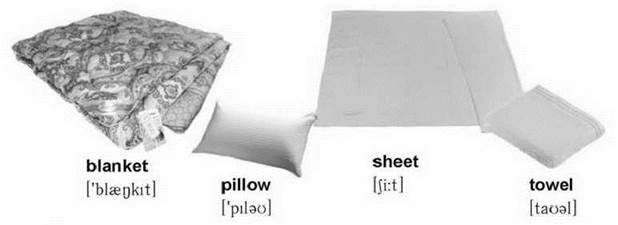
B) Listen to the story about Mrs McBright’s shopping day and say what she bought for Betty.
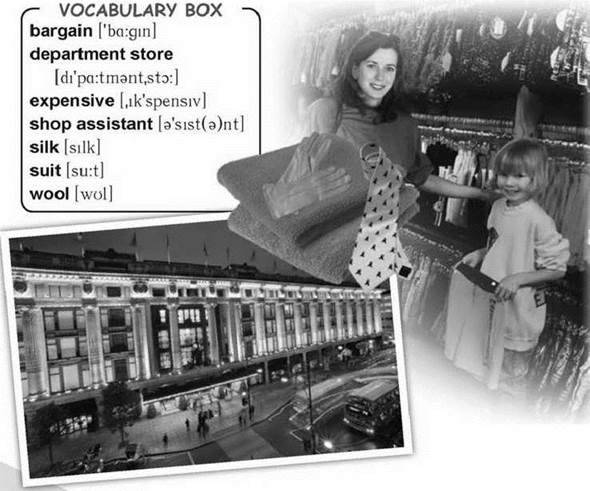
С) Answer the questions.
1 What is Selfridge’s?
2 Where is this store situated?
3 What does the White Sale mean?
4 What did Mrs McBright want to buy?
5 What was the price of the towels?
6 What kind of sheets did she buy?
7 When will Mrs McBright get all she has bought?
8 What did Mrs McBright buy for her husband.
9 What did she buy for herself?
4 Work in pairs. Name:
– the soft hair of the sheep
– something that is used to cover a bed
– things which are made of wool
– something that is used to put one’s head on
– omething that is used on beds to keep people warm
– something that is used to dry parts of one’s body
– the word which is used to say that we need something
5 Listen and choose the correct words.
In a Clothes Shop Shop Assistant: May I help / kiss you?
Customer: Yes, I’m looking for a book/sweater.
Shop Assistant: What colour?
Customer: Blue / Red.
Shop Assistant: Here you are Customer: How much is it?
Shop Assistant: EUR 10/EUR 20. Do you like it?
Customer: Yes, it’s horrible1 /perfect.
Shop Assistant: You can pay at the restaurant / cash register. Customer: Thanks.
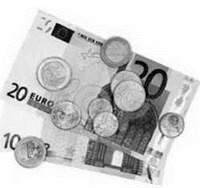
1horrible – жахливий
GRAMMAR
1 Ask and answer in pairs.
– Where were you…
…five minutes ago? / yesterday at 3 pm? / yesterday at 9 pm? / last weekend? / last July?
– Who were you with?
2 Match and read the pairs aloud.
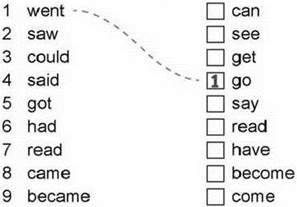
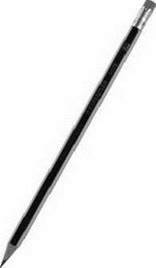
3 Listen to the rap and sing it along.
Great Past Simple Tense Rap
Anna read legends,
Anna read tales,
When she read her stories,
Children said, “Great!”
Charlie came from England,
Charlie went to the USA,
His films got the Oscar,
And people said, “Great!”
When people saw Leo’s paintings,
They said, “Great!”

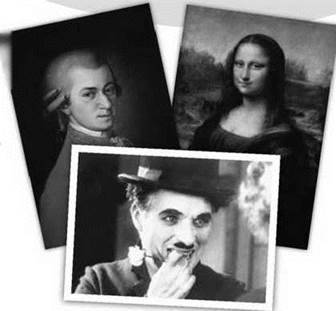
When Leo saw Lisa,
He said, “Great!”
Mozart could write music,
He could sing and play.
When he became famous,
People said, “Great!”
They all had good times,
They all had bad times,
They all became famous,
And people said, “Great!”
4 Speak about your last visit to a department store or a supermarket. Say what you saw there, what you bought there, what the prices were, how much money you spent there.
5 In pairs ask and answer about shops you will go to and what you will buy when you come to Paris.
6 Look and think what you ‘II buy for the party.
A) You’ve got £20.
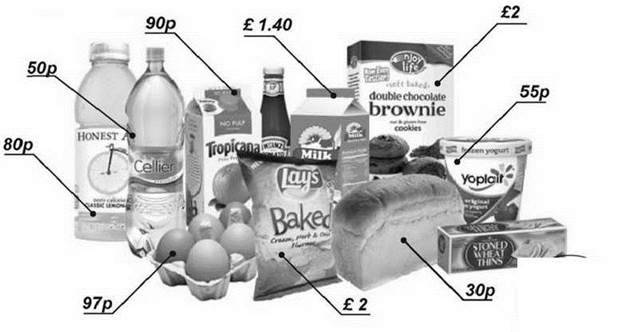
B) Plan your party. Discuss it in pairs. Example:
A: Will we need any bread?
B: Yes.
A: How much is it?
B: It’s 30p a loaf.
A: How many loaves will we need?
B: Four, I think.
A: No, three will be enough.
B: OK. Three. That will be 90p for bread.
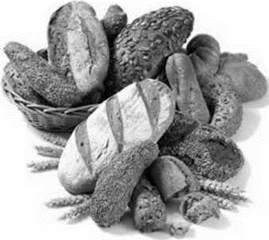
7 a) Write as in the example.
Slow – slower – the slowest
Wonderful – more wonderful – the most wonderful
Interesting, large, famous, fantastic, expensive, good, cheap, bad, delicious, economical, convenient, small, close
B) Complete with the correct degree of comparison of each adjective in brackets.
The market is (close) … to the McBrights’ house than supermarket. Mrs McBright thinks the market is (good) … than the supermarket. Fruit and vegetables there are (fresh) … than vegetables and fruit in the supermarket, and they are also (cheap) … than the ones in the shops. Mrs McBright thinks the market is (exciting) … place in London. It’s (colourful) … than the shops in the high street. She thinks the market is (good) … place to shop in London.
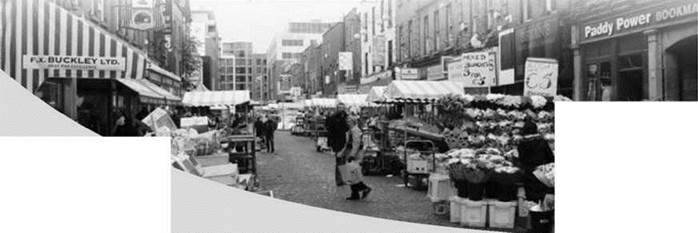
SPEAKING
1 a) Read the e-mail letters and speak on the girls’ impressions of shops in London.
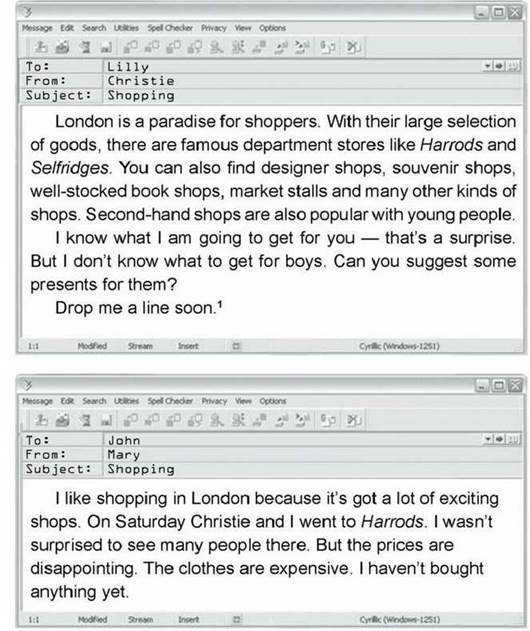
1to drop a line – накинути рядок (написати коротко)
2disappointing – такі, що розчаровують
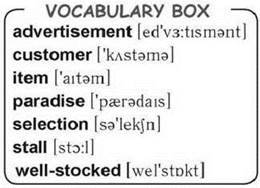
B) Answer the questions.
1 What kind of shops can everyone find in London?
2 What kind of shops are popular with young people?
3 Has Christie bought any presents for her friends in Ukraine?
4 Where were the girls on Saturday?
5 What was the place like?
6 Has Mary bought any clothes?
7 Does Mary like shopping in London?
8 Why does Christie call London a paradise for shoppers?
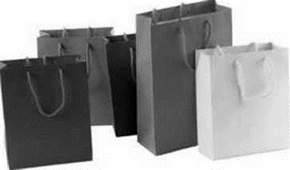
2 In groups, discuss the prices in Britain of the goods below and compare with the prices in Ukraine.
A daily newspaper
A litre of milk
A loaf of bread
A packet of cigarettes
A litre of petrol
A pair of jeans
A cup of coffee
A small family car
A cinema ticket
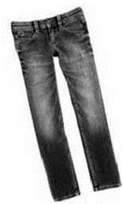

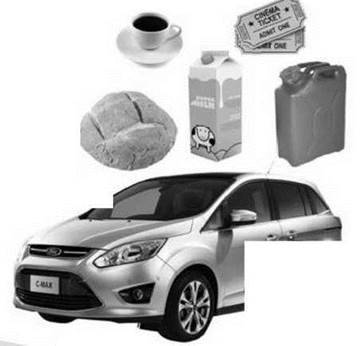
3 Read and act out the dialogues in pairs.
A: There is little flour left. Will you go to the grocer’s and buy a bag of flour, please?
B: Shall I also buy a bag of sugar?
A: Yes, please. Buy two bags of sugar and a packet of tea.
B: What about s>
A: There is a lot. But you can buy a jar of sour cream and two bottles of oil. Is that OK?
* * *
A: Good morning. What can I do for you?
В: I want a pound of carrots and a large cabbage, please.
A: Yes, certainly. Anything else?
B: Some fruit, please, six oranges and two pounds of apples.
A: Any grapes?
B: No, nothing else, thank you.
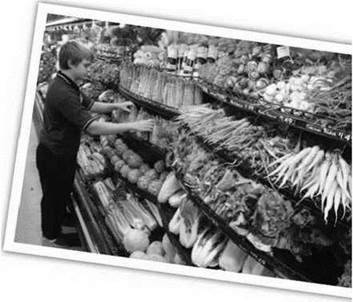
4 a) Put each dialogue in the right order and act it out. Work in pairs.
□ Hello.
□ Oh, I forget, I need a plastic bag, please.
□ One kilo of English Cox apple, please.
□ Thank you.
□ Here you are.
□ Hello.
□ 90 p for a kilo.
□ They are 20 p.
□ Here’s the money and thanks a lot. Goodbye.
□ How much are they?
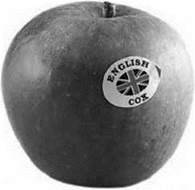
B)
□ All right.
□ Yes, two cartons.
□ John, would you go and get some sugar?
□ Yogurt?
□ Shall I get anything else?
□ Yes. How much shall I get?
□ Oh, yes, get a bottle of milk or, perhaps two, and yes, some yogurt, too.
□ Get one packet.
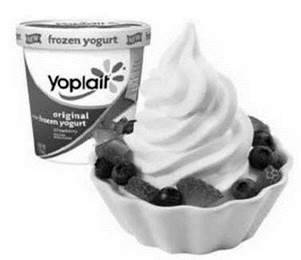
5 Look at the pictures and answer the questions below.
They are the 8 best-selling items in Britain.
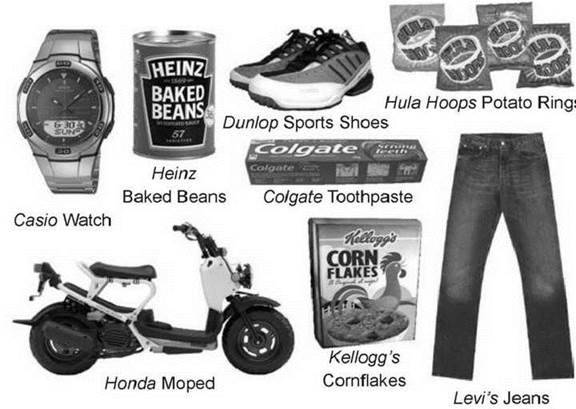
– Why do Britons buy these things most?
– Would you like to buy any of these things? Why?
6 Role-play in pairs. Imagine you are at Selfridge’s.
Pupil A, you are a shop assistant.
Pupil B, you are a customer.
Use the phrases from the boxes below.
Phrases for A
Can I help you?
(A small one or a large one?)
Yes, anything else?
What size?
It costs…
Certainly, sir/ madam.
It suits you perfectly.
Phrases for В
Can I have… please?
(A large one, please.)
Yes, I’d like…
I think… will be OK.
Now I need…
Can I try it / them on?
How much is it / are they?
Here is the money.
7 Role-play some situations on doing shopping at ready-made clothes department. Work in a group of three.
Collect some outdoor clothes like jackets and coats, and put them on a desk at the front of the class. One of you is a shop assistant.
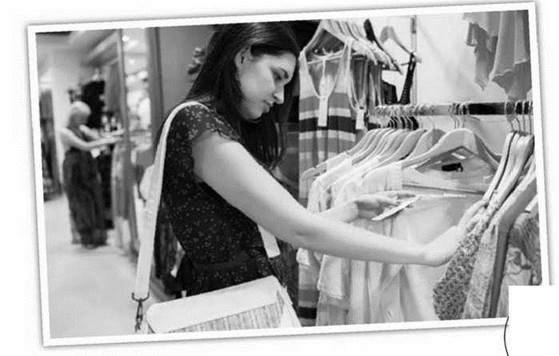
WRITING
1 Read the advertisement. Use it as an example to write your own advertisement for one or two best selling things in Ukraine. Make a drawing or design it with cutting-outs to present your advertisement in front of the class.
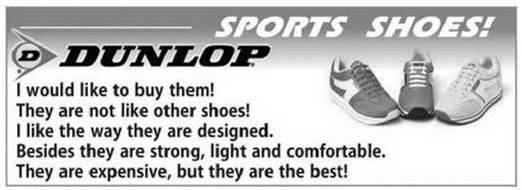
2 Make a poster about shops in your town Work in a group of four.
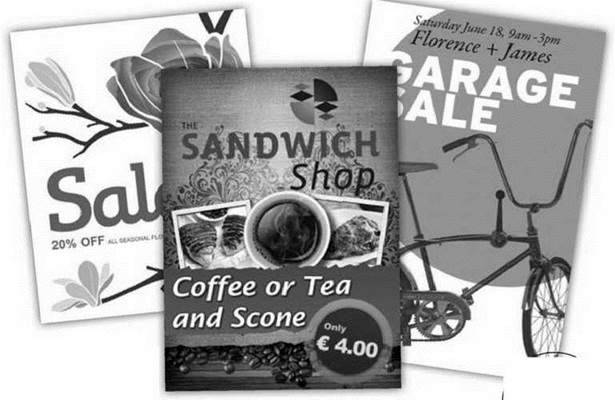
FILE FOR PROJECT
1 Brainstorm1 your ideas.
– Choose 3-4 shops.
– What goods do they sell?
– What can you say about the selection and prices?
Are they well-stocked?
– What is the staff2 like? Is it helpful or too busy to answer your questions?
– How can you get the information about the shops?
2 Write a short information about each of the shops.
3 Take a photo or make your drawings / cutting-outs to design your poster. Do captions.
4 Present your poster in class.
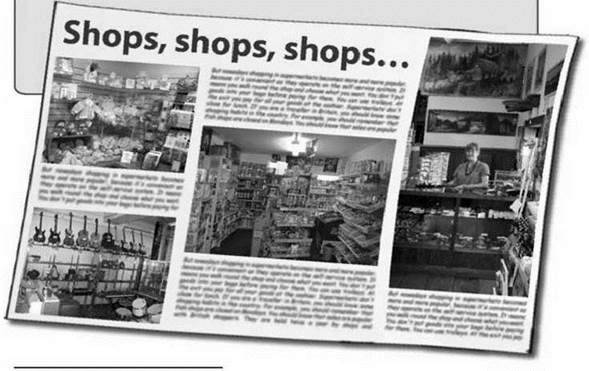
1Brainstorm your ideas. – Висловлюй свої думки.
2staff [sta:f] – працівники
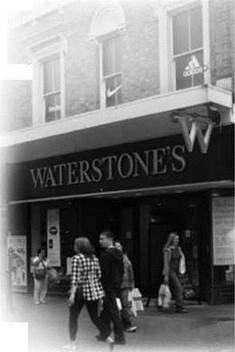
LOOK BACK!
1 Answer the questions as in the examples.
Example:
– Where did he buy this book?
– He bought it at Waterstones.
– Did he buy his sneakers at the sports shop?
– Yes, he did. / No, he didn’t.
A
1 Where did she find her dress?
2 Where did you last see the snow?
3 Did you find this exercise difficult?
4 Did your mum buy cheese?
5 Did you come here by tram?
6 What languages did you study last year?
В
1 What did you drink in the morning?
2 When did you last eat cake?
3 Did you go to the Crimea last summer?
4 When did you get up yesterday?
5 What did you have for breakfast?
6 Did you think about going shopping yesterday?
7 How did you like your friend’s birthday?
2 Fill in the gaps with ‘much’, ‘many’, ‘is’ or ‘are’.
How……………… s>
How……………… packets of s>
How……………… sugar do you need for you cake?
How……………… bottles of water are there in the fridge?
How……………… loaves of bread have you got?
There……………. cans of tuna fish on the table.
There……………. fish in the freezer.
There……………. chocolate in this ice cream.
There……………. bars of chocolate in my bag.
3 Look at the pictures
And complete the information what Ben, Anna and Lewis had for breakfast today.
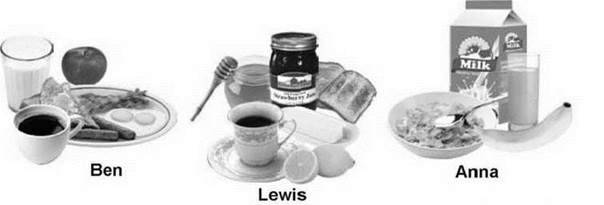
For breakfast Ben had bacon and…, a cup of…, a… of milk and a… .
For breakfast Anna had a… of cereals with…, a glass of orange… and a… .
For breakfast Lewis had some toast with… and… and a… of tea with… and honey.
4 a) Read the dialogue and say where Vicky and Sam are and what time of the day it is.
Sam: What’s for breakfast?
Vicky: Well, there is some cereal.
Sam: Cereal. Have we got any eggs?
Vicky: No, sorry. Do you want a slice of bread?
Sam: OK. Where’s the jam?
Vicky: Erm, we haven’t got any jam, but we’ve got some butter. Sam: Great! Bread and butter for breakfast. Is the coffee ready? Vicky: Yes, here you are.
Sam: Can you pass me the sugar, please?
Vicky: We haven’t got any. Sorry, Sam.
Sam: Vicky, I’m going to the supermarket. Make a list of food we need!
B) Read again and make Vicky’s shopping list for Sam.
5 a) Complete the article with the words from the box.
Costs, pay (twice), cash desk, cashier (3 times), pounds
In most countries the sign at the… in a shop says something like”… HERE”. In Britain, though, it nearly always says “Please… HERE”. When you go shopping, you can often hear people say ‘please’. Let’s say you’re buying a book which… 10 pounds. You hand it to the…, who will probably say, “Ten…, please”. This sounds like “May I have the money, please?”, but it’s really just a way of talking. Even if you’ve got the money in your hand, and are giving it to the…, he or she will still say the same thing! Remember, the… is always expected to be polite.
B) Find out and say when the British say ‘please’.
6 Look at the pictures of these two shops below. Describe and compare them. Use the words from the box.
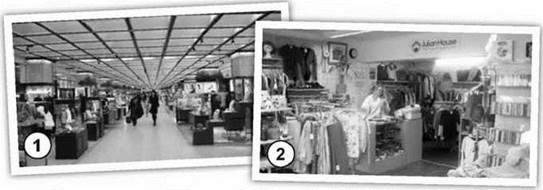
The shop in picture… is a large group of popular shops, I suppose. It is huge with the good selection of… and it is more… than the shop in picture… But…
Modern, well-stocked, wide selection, old fashioned, interesting, crowded, busy, friendly, helpful, noisy, popular, cosy, convenient, in the state, expensive, cheap, polite disappointing, exciting, well-designed, famous, surprising
7 a) Read the dialogue and write down Mike’s shopping list.
George: Are you going shopping?
Mike: Yes, I need some new batteries for my radio.
George: Here’s a ten pound note. Oh, and can you get me the TV Times?
Mike: Why can’t you go shopping yourself?
George: Because I’m lazy!
B) Make up the similar dialogue. Make a shopping list of four items. Act out in pairs.
– Are you going to the shop?
– Yes, I am.
8 Work in groups. Get ready for your class picnic.
FILE FOR PROJECT
1 Decide in groups:
A) a good place for a picnic
B) a good day to go
C) the food to take
D) the things to take (plates, cups, knives, spoons, forks, etc)
2 Begin like this:
Let’s goto… . Good idea.
When can we go?
How about on…?
What do we need?
Let’s take some… / How about some…?
OK. / No, we don’t need any…
3 Compare your ideas with other groups.
4 Can you make one plan for all the class discussions?
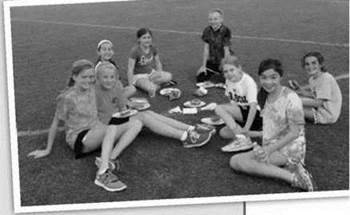
1 Read the name of the story, look at the pictures and say what you think the story is about.
2 Listen and read the story to find out what the ‘dragon soup’ is.
DRAGON SOUP
(after Tom McGowen) There was a kingdom1 and a king who was very fat because he was fond of food. He began his day with a big breakfast at 8 o’clock and had a snack at 10 and a large lunch at 12. Then he watched tennis or horses, then he had a small snack at 2 in the afternoon. At 4 he had sandwiches and at 7 in the evening he happilly sat down to a royal dinner party.
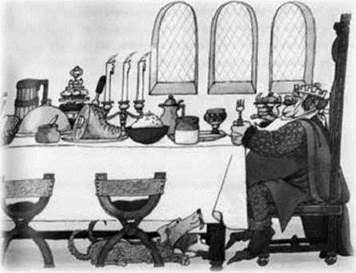
The king had one problem: he wanted to make changes in every dish. That’s why all his cooks left him because they didn’t like changing all their recipes.
“We are going to have a contest and the one who tells me the most unusual recipe can be the royal cook!” the king said one day.
1a kingdom – королівство
Reading four fun!
The next day all the people who thought they were good cooks came to the king’s castle. One young man saw that long line of people and learnt about the king’s contest. He learnt about the problem that the cooks had with the king. They didn’t like the king, who told them what to do, put things in their pots and did cooking himself. So, the young man thought a little and got into a line.
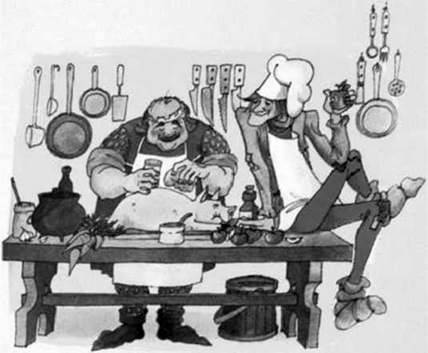
In the afternoon he finally came inside the palace. “What’s your name and recipe?” the king asked. “I’m Klaus Dinkelspies, Your Majesty1. I’ve got a recipe of a dragon soup!” The king said, “That’s interesting. What’s in it?” “Oh, I can’t tell you!” answered Klaus. “It is a secret in my family” “I understand,” said the king, “but if we can get a dragon, you must cook it for me. You are the new royal2 cook now.”
1Your Majesty – Ваша Величність
2royal – королівський
Klaus felt good. When the king wanted any dish, Klaus asked him, “Would Your Majesty tell me exactly1 how you want this dish cooked?” The king was happy not only to give him instructions but to cook happilly in the kitchen. Klaus only kept saying, “Oh, I usually use the same method.” When a dish was ready, he said, “I thank you for all your instructions, sir. Now I can invite you to the dinner party!”
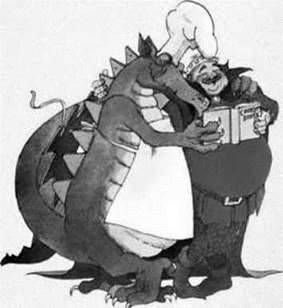
Time passed. One morning the king shouted, “Surprise!
Now you can cook your special dragon soup. I am not going to come into the kitchen. I remember it’s your secret!” The soldiers brought the cage2 with the real dragon. Klaus looked at it and saw a tear3 on the dragon’s cheek. “Are you going to kill me?” he asked. “Believe me, dragon,” said Klaus. “I don’t want to cook you. I just wanted to fool the king and show I was a cook. I can’t make any soup.” “Oh, it’s easy,” said dragon.
“Can you cook?” asked Klaus. “Well, I’m a good cook,” answered the dragon and Klaus began to smile…
1exactly – точно
2a cage – клітка
3a tear – сльоза
At 7 in the morning the king came to taste Klaus’s wonderful dragon soup. After four helpings1 he said, “That is one of best soups I’ve ever eaten!” “You see, the thing that makes dragon soup so unusual is that it can only be when a dragon cooks it itself! Let me introduce2 my assistant!” Klaus called and the dragon came in, wearing a tall white cook’s hat and an apron3.
So, Klaus was happy to live in the beautiful palace without working hard. The dragon felt good to be an assistant of the royal cook. But the happiest of all was the kitchen helper. He didn’t need to light4 fire because the dragon lighted his own stove5 by shooting fire out of his nose!
3 Answer the questions.
1 How do you know that the king was fond of eating?
2 What sort of cook did the king need?
3 What did Klaus do to become a royal cook?
4 Did the king like his new cook? Why?
5 Was Klaus a kind and clever man? How do you know?
6 Who was the happiest in the end? Why?
4 Work in a group of four.
A) Divide the story into the passages6 and give the headings to each of them.
B) Use your list of headings as a plan to retell the story.
1a helping – порція
2to introduce – представляти
3an apron – фартух
4to light – запалювати
5a stove – піч
6a passage – уривок
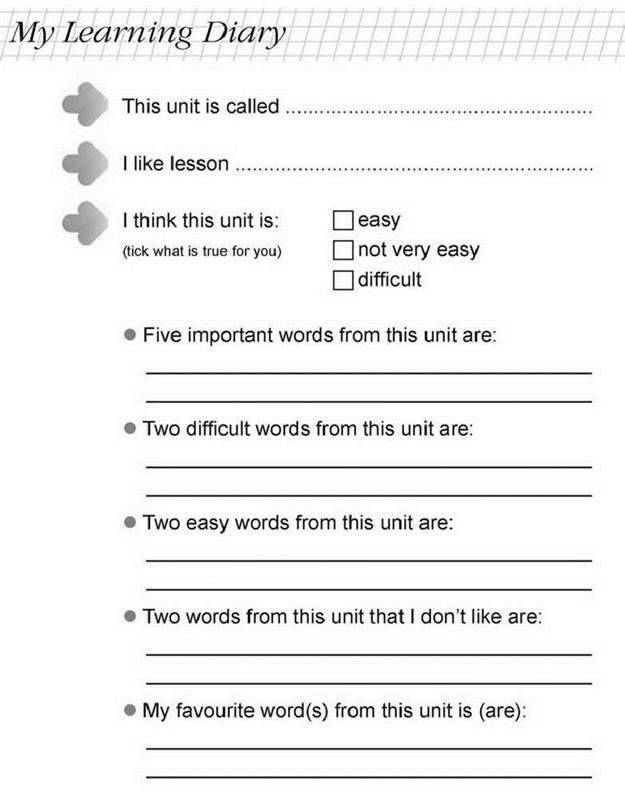
My Learning Diary
After the unit I can:
(tick what is true for you)
